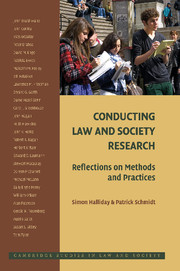Book contents
- Frontmatter
- Contents
- List of Contributors
- Acknowledgments
- 1 Introduction: Beyond Methods – Law and Society in Action
- 2 Stewart Macaulay and “Non-Contractual Relations in Business”
- 3 Robert Kagan and Regulatory Justice
- 4 Malcolm Feeley and The Process Is the Punishment
- 5 Lawrence Friedman and The Roots of Justice
- 6 John Heinz and Edward Laumann and Chicago Lawyers
- 7 Alan Paterson and The Law Lords
- 8 David Engel and “The Oven Bird's Song”
- 9 Keith Hawkins and Environment and Enforcement
- 10 Carol Greenhouse and Praying for Justice
- 11 John Conley and William O'Barr and Rules versus Relationships
- 12 Sally Engle Merry and Getting Justice and Getting Even
- 13 Tom Tyler and Why People Obey the Law
- 14 Doreen McBarnet and “Whiter than White Collar Crime”
- 15 Gerald Rosenberg and The Hollow Hope
- 16 Michael McCann and Rights at Work
- 17 Austin Sarat and William Felstiner and Divorce Lawyers and Their Clients
- 18 Yves Dezalay and Bryant Garth and Dealing in Virtue
- 19 Patricia Ewick and Susan Silbey and The Common Place of Law
- 20 Hazel Genn and Paths to Justice
- 21 John Braithwaite and Peter Drahos and Global Business Regulation
- 22 John Hagan and Justice in the Balkans
- 23 Conclusion: “Research Is a Messy Business” – An Archeology of the Craft of Sociolegal Research
- Index
- Cambridge Studies in Social and Cultural Anthropology
2 - Stewart Macaulay and “Non-Contractual Relations in Business”
Published online by Cambridge University Press: 09 February 2010
- Frontmatter
- Contents
- List of Contributors
- Acknowledgments
- 1 Introduction: Beyond Methods – Law and Society in Action
- 2 Stewart Macaulay and “Non-Contractual Relations in Business”
- 3 Robert Kagan and Regulatory Justice
- 4 Malcolm Feeley and The Process Is the Punishment
- 5 Lawrence Friedman and The Roots of Justice
- 6 John Heinz and Edward Laumann and Chicago Lawyers
- 7 Alan Paterson and The Law Lords
- 8 David Engel and “The Oven Bird's Song”
- 9 Keith Hawkins and Environment and Enforcement
- 10 Carol Greenhouse and Praying for Justice
- 11 John Conley and William O'Barr and Rules versus Relationships
- 12 Sally Engle Merry and Getting Justice and Getting Even
- 13 Tom Tyler and Why People Obey the Law
- 14 Doreen McBarnet and “Whiter than White Collar Crime”
- 15 Gerald Rosenberg and The Hollow Hope
- 16 Michael McCann and Rights at Work
- 17 Austin Sarat and William Felstiner and Divorce Lawyers and Their Clients
- 18 Yves Dezalay and Bryant Garth and Dealing in Virtue
- 19 Patricia Ewick and Susan Silbey and The Common Place of Law
- 20 Hazel Genn and Paths to Justice
- 21 John Braithwaite and Peter Drahos and Global Business Regulation
- 22 John Hagan and Justice in the Balkans
- 23 Conclusion: “Research Is a Messy Business” – An Archeology of the Craft of Sociolegal Research
- Index
- Cambridge Studies in Social and Cultural Anthropology
Summary
If there is any piece of work discussed in this volume that most unquestionably can be called a “classic,” this is it. Necessary to any suggestion of a “canon” of Law and Society is a judgment about what constitutes good or important scholarship. Certainly, one quality of significant sociolegal work is that it illuminates the world as it is in practice, not as lawyers and legal scholars assert it to be. The areas of law most frequently relegated to the dry covers of legal treatises – contracts, bankruptcy, tax, estates, and so on – thus have the best potential to reveal new sides when subjected to the sunlight of critical inquiry. What we learn from such studies can be quite dramatic in terms of the sheer gap between theory and practice, and the discovery of that gap speaks to the power of empirical study of law as a whole.
Stewart Macaulay's landmark article, “Non-Contractual Relations in Business: A Preliminary Study,” is one such eye-opening exercise in empirical exploration. Contrary to the assumptions of the legal creed, he found a world in which law was not central – where custom and other noncontractual social practices provide order. Undoubtedly the freshness of his discoveries were aided by the state of the field – indeed, the Law and Society Association was not formed until 1964 – and subsequent research has noted many changes in the use of law by businesses in the late twentieth century. The article nevertheless remains much read and cited. Today, Macaulay's position vis-à-vis methodology and empirical research is not uncommon.
- Type
- Chapter
- Information
- Conducting Law and Society ResearchReflections on Methods and Practices, pp. 14 - 25Publisher: Cambridge University PressPrint publication year: 2009



